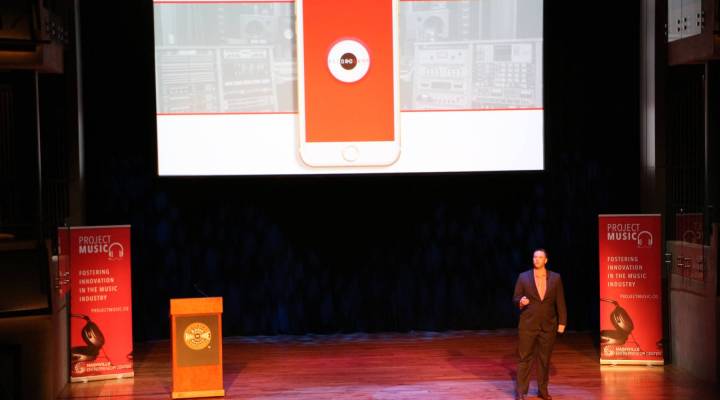
Nashville accelerator home for music tech start-ups

Erik Mendelson and Winston Thomas are waiting backstage at the Country Music Hall of Fame, but they won’t be crooning country tunes.
They’ve created a music app, and this is their pitch day: Mendelson is about to ask a room full of investors to give them $450,000.
“He looks nervous,” Thomas says, looking over at his cofounder. Mendelson shakes his head.
A few minutes later, Mendelson takes the stage in front of a giant projector screen. The company logo for RecordGram pops up.
He explains the idea behind RecordGram: big-name producers can upload their leftover beats on this app, and people can license them in their own work. He pitches confidently about the company’s numbers, its revenue potential and its celebrity ties (one of the cofounders is Shawn Mims, the hip-hop artist best known for the 2007 hit song “This Is Why I’m Hot”).
But ultimately, none of those investors in the audience bite. Mendelson says companies like his are a hard sell.
“Getting investment to music technology is difficult, no matter what city you’re in, even in San Fran and New York and Austin and Los Angeles,” he said.
Here’s the dilemma for music tech startups. They can try to court traditional tech investors, but the music business is more complex than your average Silicon Valley startup.
“The music industry has been a very volatile business, in the sense that it’s constantly changing, the licensing of the rights are very, very complicated,” Heather McBee said, who put on this pitch day in Nashville. “That scares some investors away.”
Some music tech companies have made it, like Spotify and Pandora, but they’re the exceptions. Others have failed spectacularly. The music streaming site Grooveshark, for example, had tens of millions of users before it was hit by a massive lawsuit and shut down last year.
So tech investors are wary of getting involved. And on the other side, music companies — who you might think would be interested in music technology —haven’t been clamoring to invest either.
“These guys every day are running records up the charts and signing acts and making records and setting up tours and doing production,” former music executive Joe Galante said. “Who’s got time to think about tech?”
When Galante was chairman of Sony Music Nashville, he saw the untapped potential of technology in the music business. After he left, he decided to co-found an accelerator — a sort of boot camp that whips startups into shape and helps them find funding — specifically for music tech companies. And he decided he could make it work in Nashville, even though that industry barely existed.
“We have basically a music capital here. Would it be unusual for music tech to come out of here?” Galante said. “I don’t think so. We’ve just never did it before.”
The accelerator, called Project Music, has graduated more than a dozen music tech startups over the past year, many of which set up shop in Nashville afterward. They range from sheet music software to a karaoke platform.
It has gotten some heavy hitters in the music business to put money into the accelerator. The Country Music Association is the lead sponsor. But McBee, who runs the program, says it’s not easy getting these companies on board.
“It’s called connections and just working the hell out of a Rolodex,” she said, laughing.
Some of the program’s young graduates have had initial success. One of the most touted is Dart Music, a company that helps classical musicians sell their work online. It’s raised nearly $1.8 million from investors.
Galante thinks this will continue as music tech proves its worth — especially, he hopes, from those companies coming out of Project Music in Nashville.
“I don’t care what business you’re in. People flock to success,” he said.
There’s a lot happening in the world. Through it all, Marketplace is here for you.
You rely on Marketplace to break down the world’s events and tell you how it affects you in a fact-based, approachable way. We rely on your financial support to keep making that possible.
Your donation today powers the independent journalism that you rely on. For just $5/month, you can help sustain Marketplace so we can keep reporting on the things that matter to you.


















